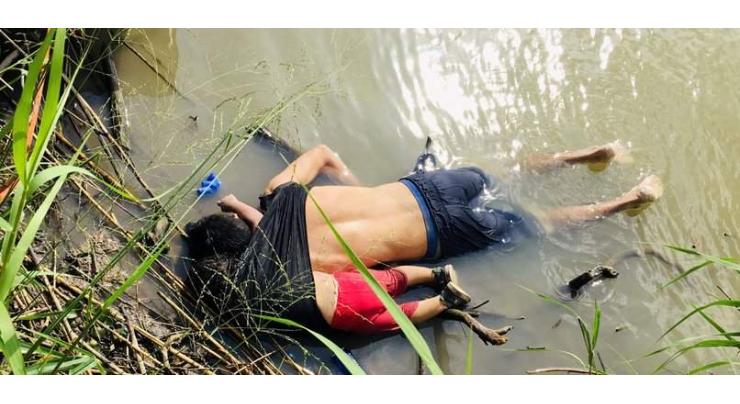
Photo Of Dead Migrants On US Border 'searing': UNICEF Chief
Mohammad Ali (@ChaudhryMAli88) Published June 28, 2019 | 11:52 AM

A shocking photograph of a Central American migrant and his infant daughter who drowned while attempting to cross the Rio Grande along the U.S.-Mexico border "should shake each of us to our core," the head of the UN's children's agency said today
UNITED NATIONS, (APP - UrduPoint / Pakistan Point News - 28th Jun, 2019 ):A shocking photograph of a Central American migrant and his infant daughter who drowned while attempting to cross the Rio Grande along the U.S.-Mexico border "should shake each of us to our core," the head of the UN's children's agency said today.
"The heart-rending photo published just yesterday showing the lifeless bodies of Salvadoran toddler Valeria and her father Oscar on the bank of the Rio Grande is a stark reminder of the perils facing migrants trying to reach the US," Henrietta Fore, the UNICEF Executive Director, said in a statement.
"It is a searing image that should shake each of us to our core," she added.
The visceral photo of Oscar Alberto Martinez Ramirez and his daughter, Valeria, depicts Valeria drawn in tight to her father as they lay dead, face down in thick brown mud.
U.S. President Donald Trump earlier Wednesday sought to blame Democrats for the tragedy, calling on them to change the U.S.'s amnesty laws to avert future disasters.
"If they fixed the laws, you wouldn't have that," Trump told reporters at the White House before departing for a G-20 gathering in Japan. "They are running through the Rio Grande. It can be a very rough river of sorts. There are times when going across the Rio Grande is very, very dangerous." But Ramirez and his daughter did not die because of the U.S.'s asylum laws, it was pointed out.
They decided to make the perilous journey across the Rio Grande after having grown desperate from failing to have their asylum request heard by U.S. border officials, according to reporting from La Jornada, the Mexican newspaper that first published the photograph.
The Trump administration has imposed a policy of "metering" the number of people who can claim asylum at points of entry, which has dramatically reduced the amount of asylum requests heard daily.
The photo of Ramirez and his daughter lying face down on the bank of the Rio Grande has drawn parallels to that of Alan Kurdi, a three-year-old Syrian Kurdish refugee who drowned in the Mediterranean Sea after fleeing the country's ongoing conflict.
Kurdi's photo drew international headlines, focusing global attention on the Syrian conflict.
In the Western Hemisphere, many from Central America, including El Salvador, are fleeing the region's rampant gang violence and astounding levels of poverty in hopes of receiving asylum in the U.S.
Fore, the UNICEF executive director, further raised alarm over the conditions that children seeking asylum are being faced with after they are taken into U.S. custody, cautioning "reports coming from some of these facilities are grim".
"Having already faced perilous journeys, some children are now being sheltered at facilities that are not equipped to meet the needs of this vulnerable population," she said.
"It's hard to fathom this happening in a country with such a rich history as a champion for children in need around the world, particularly for those uprooted from their homes and communities by crisis. By any measure, these ARE children in need � I have met them." In a video that has since gone viral, a government lawyer sought to argue that detaining children in facilities without access to showers, blankets and toothbrushes could still be considered safe and sanitary after the Associated Press reported on squalid conditions at one detention center in Texas.
The administration has since moved the vast majority of the children at the Clint Border Patrol station in El Paso County, Texas to a different holding location.
Under U.S. law, children who are detained by the Border Patrol are supposed to be transferred to the custody of the Office of Refugee Resettlement within 72 hours.
Many of those who were detained at the facility visited by the AP said they had been there for weeks.
Related Topics
Recent Stories

HEC reviews curricula for environmental sciences degree programme

ICC Asia looking forward to an action-packed Asia Cricket Week

Yuvraj Singh named ICC Men’s T20 World Cup 2024 Ambassador

Greece hands Olympic flame to 2024 Paris Games hosts

Two Kyiv hospitals evacuating over feared Russian strikes

World must act on neurotech revolution, say experts

Charles & Catherine's cancer diagnoses

Champions Alcaraz and Sabalenka through in Madrid Open

King Charles to resume some public duties during cancer treatment: palace

US defense chief announces $6 bn in security aid for Ukraine

Heavy rains cause damage to Spezand-Taftan railway track

Woman stabbed in Israel, attacker killed: police
More Stories From World
-
NFL will allow players to wear Guardian Cap helmets in games
3 hours ago -
Football: German Bundesliga table
3 hours ago -
Football: Italian Serie A result
3 hours ago -
Football: German Bundesliga results
3 hours ago -
US troops to leave Chad in second African state withdrawal
3 hours ago -
Plastics pollution may be solved without production cap: Canada minister
3 hours ago
-
Biden stalls on menthol cigarette ban fearing Black vote backlash
3 hours ago -
Champions Alcaraz and Sabalenka through in Madrid Open
3 hours ago -
6,000 French police to welcome Olympic torch amid bonus boost
4 hours ago -
Taiwan hit by several quakes, strongest reaching 6.1-magnitude
4 hours ago -
'Ballistic' Bairstow stars as Punjab pull off record T20 chase
4 hours ago -
Tennis: ATP/WTA Madrid Open results - 2nd update
4 hours ago